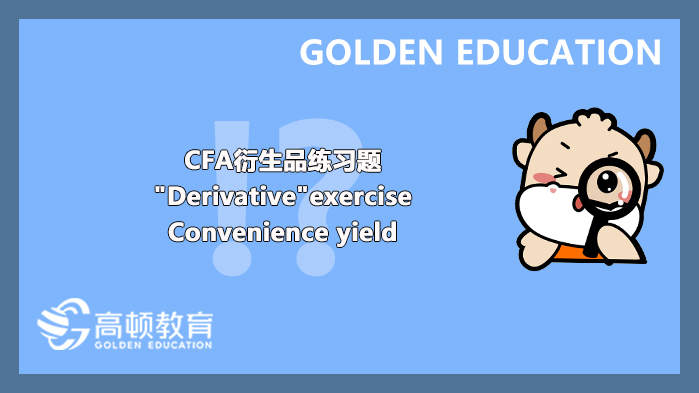随着国内逐渐开放衍生品市场,越来越需要有衍生品专业知识的人才。这部分的衍生品主要介绍衍生品的一些基本知识,包括衍生品的种类及市场区分,4大类衍生品的基本定价原理,以及简单期权策略。
CFA一级考试的Derivatives(金融衍生品)具体的内容知识点包含1个study session,3个reading。
其中,Reading 57对衍生品市场进行了区别,并对4大类衍生品进行了基本定义;
Reading 58讲衍生品的定价和估值的基本原理,并对4大类衍生品的基本定价做了介绍;
Reading 59对期权做了进一步分析,介绍两种期权及两种期权策略的应用。
从考试的重要度来看,Reading 58、Reading 59是最重要的,Reading 57其次,其他Reading重要性不大。
以下是高顿教育冯老师对重要的Reading的考点进行了总结,以下内容建议考生们全部掌握。
★ Reading 57:Derivative Markets and Instruments(金融衍生品市场及工具)
金融衍生品的定义;
金融衍生品市场的分类及区别;
金融衍生品的分类;
金融衍生品的优缺点。
★ Reading 58:Basics of Derivative Pricing and Valuation(金融衍生品基本定价和估值原理)
金融衍生品定价的基本原理;
区别远期和期货合约的定价以及估值;
合约期初、期中、期末如何计算远期的价值,以及理解影响远期价值的因素;
解释期货和远期定价的异同;
解释互换和远期定价的不同;
欧式期权价值的计算以及影响因素;
欧式期权的平价公式、远期平价公式以及二叉树模型的理解;
美式期权与欧式期权定价的差异。
★ Reading 59:Risk Management Applications of Option Strategies(风险管理应用:期权策略)
看涨期权和看跌期权的到期价值、利润、小盈亏、盈亏平衡点的计算;
Covered call和protective put的到期价值、利润、小盈亏、盈亏平衡点的计算。
 CFA衍生品练习题
CFA衍生品练习题 "Derivative"exercise:Convenience yield
"Derivative"exercise:Convenience yield
Questions 1:
The value of a long position in a forward contract at expiration is best defined as:
A、forward price agreed in the contract minus spot price of the underlying.
B、spot price of the underlying minus forward price agreed in the contract.
C、value of the forward at initiation minus spot price of the underlying
【Answer to question 1】B
【analysis】
B is correct.The value of a long position in a forward contract at expiration is defined as spot price of the underlying minus forward price agreed in the contract.
A is incorrect.This is the value of a short position.
C is incorrect.The value of a long position in a forward contract does not depend on the value of the forward at initiation.
Questions 2:
Convenience yield is best described as a nonmonetary benefit of holding a(n):
A、option contract.
B、asset.
C、forward contract.
【Answer to question 2】B
【analysis】
B is correct.Convenience yield represents the nonmonetary advantage of holding the asset.
A is incorrect.Convenience yield is a benefit for the holder of the asset and not the holder of an option contract.
C is incorrect.Convenience yield is a benefit for the holder of the asset and not the holder of a forward contract.
版权声明:本条内容自发布之日起,有效期为一个月。凡本网站注明“来源高顿教育”或“来源高顿网校”或“来源高顿”的所有作品,均为本网站合法拥有版权的作品,未经本网站授权,任何媒体、网站、个人不得转载、链接、转帖或以其他方式使用。
经本网站合法授权的,应在授权范围内使用,且使用时必须注明“来源高顿教育”或“来源高顿网校”或“来源高顿”,并不得对作品中出现的“高顿”字样进行删减、替换等。违反上述声明者,本网站将依法追究其法律责任。
本网站的部分资料转载自互联网,均尽力标明作者和出处。本网站转载的目的在于传递更多信息,并不意味着赞同其观点或证实其描述,本网站不对其真实性负责。
如您认为本网站刊载作品涉及版权等问题,请与本网站联系(邮箱fawu@gaodun.com,电话:021-31587497),本网站核实确认后会尽快予以处理。

 CFA衍生品练习题
CFA衍生品练习题


 更多服务
更多服务












